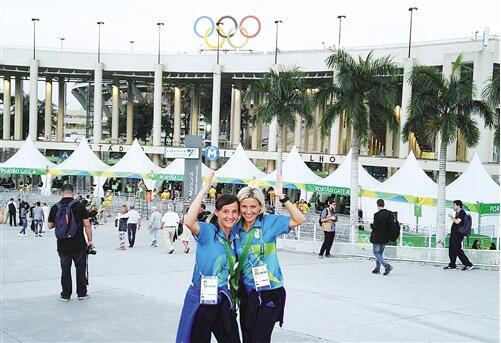Source:2016-08-08

A Sscene from the OpeningCeremony shows green scheme for the set design, depicting the concept of greenOlympics. Photo: Xinhua News Agency

Colourful set design reflecting the unique culture of Brazil. Photo:Xinhua News Agency

A performance at the Opening Ceremony. Photo: Li Ming, Xinhua News Agency

A performance at the Opening Ceremony. Photo: Li Ming, Xinhua News Agency

A performance at the Opening Ceremony. Photo: Lv Xiaowei, Xinhua News Agency

A performance at the Opening Ceremony. Photo: Li Ming, Xinhua News Agency

A performance at the Opening Ceremony. Photo: Lv Xiaowei, Xinhua News Agency

A performance at the Opening Ceremony. Photo: Lv Xiaowei, Xinhua News Agency

Brazilian supermodel Gisele Bundchen performing at the Opening Ceremony.Photo: Li Ming, Xinhua News Agency

A display of fireworks at the Opening Ceremony.Photo: LvXiaowei, Xinhua News Agency11.jpg
A display of fireworks at the Opening Ceremony. Photo: Li Ming, Xinhua News Agency

The Olympic flame is ignited at the Maracana Stadium in Rio de Janeiro,Brazil. Photo: Xinhua News Agency

Volunteers take photos in front of the Maracana Stadium entrance. Photo: Xu Huixi, Special Correspondent of EconomicsDaily

Athletes cheer along the way from the underground station to the OpeningCeremony venue. Photo: Xu Huixi, of SpecialCorrespondent Economics Daily
By Xu Huixi ofEconomics Daily
(www.ce.cn) -- On the 120th anniversary of modernOlympics, the opening ceremony of the 31st Summer Olympics was held atthe Maracana Stadium in Rio de Janeiro, Brazil on the evening of August 5(local time). The “small-budgeted” Opening Ceremony left an everlastingimpression on the audience’s hearts through the projection of the green Olympicsphilosophy in the performances.
The Olympic flame will be passed down throughgenerations and the Olympic rings will illuminate the South America.
Liu Yandong, Vice Premier of the State Council and SpecialRepresentative of President Xi Jinping, attended the Opening Ceremony.
Sunshine, samba, carnival, rainforest, passion,wildness, bossa nova, the girl from Ipanema… What would it be like if all thesetypical Brazilian elements were integrated into a “giant party” of “a newworld”? Everyone who has watched the performances at the opening ceremony ofthe Rio Olympics, be it at the Macarana Stadium—the “holy temple offootball”—or in front of a large screen, has their own answers.
A Brazilian poet once wrote, “Brazil is not in theworld in daytime. Brazil is the world when the night comes.” This quote perfectlydescribes the Olympics’ opening ceremony. “It’s unthinkable not to mentioncarnival when we are hosting an Olympics in Rio,” said Meirelles, director ofthe opening ceremony, stressing that samba and carnival are “very Brazilian”lifestyles.
At the grand sports event watched by the whole world,it was the secret wish of Brazil to invite athletes from across the world to dosome samba to distinctively South American “bossa nova” music and truly get a tasteof the carnival’s passion. And this was the Brazilian “brand” of the year’sOlympics.
In contrast with other opening ceremonies, themajority of performers at the Rio Olympics were non-professionals who came fromacross the world and spoke various languages. Thousands of volunteers presented“stories of Brazil” to the world through dance performances and demonstrated inartistic forms the history of city evolvement from rain forests inhabited byindigenous people to modern metropolises, depicting a “path of aspirations ofthe Brazilian people”.
As many as 12,000 athletes from across the world walkedinto the stadium, waving their national flags. They had another key assignmenton their shoulders, which was to plant seeds of trees into a totem for them tolater grow in a park in the Deodoro area of the Rio Olympics, forming a “forestof athletes”, as a Brazilian legacy of Rio Olympics. Greenness, environmentfriendliness and sustainability were brought to life at the Rio Olympics.
“A new world” was the slogan of Rio Olympics andParalympics. Brazil had become a “new world” in the map of Olympics. It was deemedas a vast and affluent hot ground for growth and “the kingdom of the future”with tremendous potential. Due to the sluggish Brazilian economy, budget forthe Opening and Closing Ceremonies of the Olympics had been cut down to around USD56 million, less than one-tenth of the budget for London Olympics held beforeit. In spite of the budget constraints, the opening ceremony of the Rio gamesmanaged to deliver a simplistic yet heart-warming feast rich in unique connotationsand temperament.
“We focus on showcasing the Brazilian spirit. We maynot have spent much, but we will win with creativity, rhythm and emotionalappeal,” said Caetano, supervisor of the opening and closing ceremonies. “Tightbudget doesn’t have to get in the way of a brilliant performance,” he added. Beingthe first Olympics to be held after the IOC launched its 2020 agenda, thethrifty approach of the Rio games is aligned with the IOC’s reform spirit of sustainabledevelopment, thus is likely to become a new starting point of Olympics’ self-reform.
The Rio Olympics comprised of 28 sports and 306 events,with new additions of golf and 7-player rugby, as compared with the LondonOlympics held four years ago. China sent a 711-person delegation, which is the highestheadcount of any Chinese sports delegation attending offshore events. China isactively getting involved in Olympics through its concrete actions.
“Tall and tan and young and lovely, the girl fromIpanema comes walking… When she passes by, one goes, ‘Ah!’…” From that verymoment, this familiar melody will be heard in every corner of Rio de Janeiroand linger across South America.

© Copyright 2020. All rights reserved
Beijing Olympic City Development Association.All rights reserved.Beijing ICP 11016671 No.